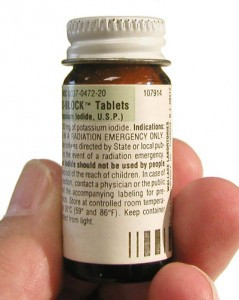Potassium iodide pills and prevention of thyroid cancer from Japanese nuclear power plant
Why did Japanese officials gear up to distribute potassium iodide in response to the explosions at the Fukushima Daiichi nuclear power plant?
According to the Union of Concerned Scientists, a nonprofit group in Cambridge, Mass., the radioactive materials that pose the greatest threat after a nuclear power accident are radioactive iodine (the iodine-131 isotope, in particular) and radioactive cesium (cesium-137), and news reports have said both have been detected outside the plant.
Radioactive iodine is a byproduct of the fission (splitting) of the uranium in the fuel rods that power a nuclear power plant. Once radioactive iodine is in the body, it concentrates mainly in the thyroid gland, which is located in the neck, just below the Adam’s apple. (See our related post on the thyroid gland and cancer from iodine-131.) But as a helpful fact sheet from the Centers for Disease Control and Prevention (CDC) explains, the gland cannot tell the difference between radioactive iodine and the radioactively stable version of the mineral it needs, so it will absorb both.
Potassium iodide pills (sometimes abbreviated as KI: the K stands for potassium, the I for  iodine) don’t prevent radioactive iodine from entering the body, but they do keep it from getting accumulating in the thyroid gland. By flooding the body with non-radioactive iodine, the pills keep the gland from absorbing the radioactive iodine. Here is how the CDC fact sheet summed it up:
iodine) don’t prevent radioactive iodine from entering the body, but they do keep it from getting accumulating in the thyroid gland. By flooding the body with non-radioactive iodine, the pills keep the gland from absorbing the radioactive iodine. Here is how the CDC fact sheet summed it up:
Because KI contains so much stable iodine, the thyroid gland becomes “full” and cannot absorb any more iodine—either stable or radioactive—for the next 24 hours.
Children and infants are more vulnerable to developing thyroid cancer from radioactive iodine than adults, so it’s important that they get the pills in a radiation emergency. But the pills can be hard to swallow, especially for infants, and potassium iodide dissolved in water has a harsh, salty taste. The FDA tip: grind the pills up and mix them into low-fat chocolate milk, orange juice, or flat soda.
Large doses of iodine over a long period of time can be dangerous, so potassium iodide pills should be reserved for true emergencies. (So far, no one is recommending that anyone in the United States take them, although people are apparently stocking up.)
Many varieties of table salt are “iodized,’ which means iodine has been added. But iodized table salt doesn’t contain enough of the mineral to saturate the thyroid gland and keep it from absorbing radioactive iodine.
About the Author

Peter Wehrwein, Contributor, Harvard Health
Disclaimer:
As a service to our readers, Harvard Health Publishing provides access to our library of archived content. Please note the date of last review or update on all articles.
No content on this site, regardless of date, should ever be used as a substitute for direct medical advice from your doctor or other qualified clinician.












